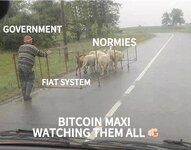I'd say less but I own physical; it's just based on the idea that the likelihood is that I won't need PMs and they are also going to zero vs BTC, like everything else.I feel like whatever you own in Bitcoin it doesn't hurt to own 5 - 10% of that amount in physical precious metals.
You are using an out of date browser. It may not display this or other websites correctly.
You should upgrade or use an alternative browser.
You should upgrade or use an alternative browser.
How normies conflate bitcoin and crypto
It was kinda hard to watch, but also interesting.
The interviewee attended one of the Bitcoin conferences (not sure what year)
He meets a bunch of degenerate shitcoiners.
But he also denigrates the “religious nature” and “they claimed grains were ‘fiat food’ and they only ate red meat(hahahahaha)…but it must have been working because most of them looked pretty fit…”
MY FAVORITE QUOTE: “speakers were making wild claims like it was going to end wars and re-shape civilization!” And both Adam and zeke start laughing.
We are so early.
It was kinda hard to watch, but also interesting.
The interviewee attended one of the Bitcoin conferences (not sure what year)
He meets a bunch of degenerate shitcoiners.
But he also denigrates the “religious nature” and “they claimed grains were ‘fiat food’ and they only ate red meat(hahahahaha)…but it must have been working because most of them looked pretty fit…”
MY FAVORITE QUOTE: “speakers were making wild claims like it was going to end wars and re-shape civilization!” And both Adam and zeke start laughing.
We are so early.
Baller
Judoka
Catholic
Do you create those memes yourself?
Pavel Durov the ceo of telegram gets arrested

Telegram And Youtube Censorship Show Bitcoin And Nostr Are Critical
Networks like Bitcoin and Nostr are more needed than ever. They give people geographic arbitrage and a hedge against state repression.
 www.forbes.com
www.forbes.com
(Cross posting this from NOSTR post, I know this is a text wall, but if you believe in the Sovereign individual thesis, read this)
Nostr reveals how Bitcoin was underestimated by everyone
The human brain is a closed physical system that carries out operations. Therefore it is, by definition, a computer. Even though it is different from your laptop in numerous ways, the brain is a kind of hardware, and the mind, including all its unconscious sub-routines, is a kind of software.
Going forward, I hope you’ll ignore the question of how accurate this description is. I’m merely trying to invoke a perspective that will help us see a deeper truth about what Bitcoin and Nostr have in common, and what sets them apart from other kinds of software. From the very beginning, I had a strong sense that Nostr is very similar to Bitcoin, and apparently, I’m not alone. The best guess seems to be that both protocols are examples of “minimalism”, but what does this minimalism consist of - especially with respect to Bitcoin? And why does it work so well?
I don’t think that even Satoshi appreciated this dimension, which isn’t all that weird when you think about it. Technological breakthroughs are always underestimated, even by those who make them happen. Gutenberg cannot possibly have imagined that his invention would cause the destruction of medieval culture, and according to legend, Newton invented calculus in the process of working out his theory of gravity, not even bothering to include it in his Principia.
Similarly, the Bitcoin whitepaper lays out a protocol for digital cash without mentioning the system’s uniqueness in terms of software engineering. Saifedean Ammous once commented that Satoshi Nakamoto seems to have been unfamiliar with Austrian economics, and speculated that he had nevertheless happened upon a software implementation of its principles by sheer force of engineering (I've tried and failed to find that clip, sorry). As I see it, this amounts to a claim that the Bitcoin network not only depends on human minds but more specifically the efficient coordination and flexibility offered by free markets.
As it happens, Bitcoin has two security mechanisms, and these in turn rely on the unhackable software of human minds to keep themselves stable in the face of unpredictable circumstances in the real world.
To deal with external threats, costly proof of work relies on a brutal incentive structure that requires miners to invest in expensive machinery and receive rewards whose value is mostly derived from the health of the network. Ultimately, the linchpin of PoW is that miners respond to these incentives in a way that is economically rational, and use their creativity to counteract all threats. In other words, the creative program running on the miners’ brains is one of several wetware components that keep the bitcoin network going.
To deal with threats from within, there is an inverted version of the same incentive structure. To safeguard the software itself, and counteract the self-interest of miners, a network of cheap nodes enact a political system where all citizens are forced to vote with their feet. Bitcoin developers play the unenviable role of would-be legislators under perfect anarchy, where the only way to get a law adopted is by convincing people into submission. Human distrust and risk aversion secure the network from the inside.
Nostr also depends on self-interested human minds. Traditional social media are centrally planned to suit the “average user”, to the degree that his needs can be squared with the wants of advertisers, regulators, and shareholders. Nostr will eventually provide whatever is in demand, but until then it is dependent on entrepreneurial pioneers who are willing to invest time and resources in the hope that the future reward them.
As an open marketplace, Nostr doesn’t need a strong incentive structure. Indeed, foisting any particular incentive on anyone would ruin everything. What makes Nostr so clever is that the basic infrastructure that enables trade - relays, apps, wallets - is just as subject to competition as everything else, leading to a different kind of robustness. Instead of Bitcoin’s iron fortress, attackers will face an endless game of whack-a-mole, and an arms race they cannot hope to win. The game theory is still the same as Bitcoin though: Attackers incur a higher cost than defenders, and for no benefit whatsoever.
Looking at the technicalities and counting lines of code, one may conclude that Bitcoin is a more advanced protocol than Nostr, but that is a parochial error. Nostr can rely on amazing software for social networking that is already running on every human brain. If humans had a natural urge to enact responsible monetary policy, Bitcoin wouldn’t need all that code. In both cases, the network consists of an amalgam of software running on microchips and brains.
It’s too soon to say how Nostr is going to develop, but as an uncensorable digital marketplace, it fits rather nicely with an uncensorable digital currency. And the ecosystem is already developing faster than anything I’ve ever seen. When a software company tells us that a new feature is coming, it means that users will wait for months while the proposal gets subjected to a litany of corporate management, bug testing, and legal scrutiny. When a Nostr developer says a feature is coming, it means he’s already started working on it, and when it goes live the next day his users will voluntarily pay him for his work via the lightning network. The development of every subroutine that is needed to operate a social media platform is now opened up to competition and monetization.
If what I’ve said so far is right, it implies at least five interesting conclusions:
First, Timothy May was right: Crypto-anarchism is the way. We’re now seeing the emergence of a fully-fledged digital civilization, where all freedoms are absolute, and money is incorruptible. In this world, jurisdictions are forced to compete for hyper-mobile citizens, and evil despots will quickly find a dearth of citizens to exploit.
This implies the second conclusion: Anarchy works pretty well. Most popular arguments against anarchism invent a world with only one state or no mobility. If citizens are free to choose, governance is solved by the free market.
Third, we’re about to get an interesting test of what a truly free market looks like. Judging by the productive frenzy that is Nostr, those who would defend government “stimulus” and “initiative” have their work cut out for them.
Fourth: Nostr is web3. Without slick designs, dedicated development teams, or as much as a penny in VC funding. Looking at the bloated carcass of Ethereum, the narrative of “exciting blockchain technology” is one step closer to oblivion. (But when will the markets catch on?)
Fifth: We’re at the turning of an age. Like Bitcoin, Nostr doesn’t have to take over the world to win. The purpose of these protocols is to bring real competition to a monopolized market, and it really doesn’t matter what the endgame looks like. So long as the monopolies have to compete, consumers will benefit.
There are no guarantees. These open protocols won't have many friends in high office, and the future is shaped by the things no one had thought about. But looking ahead it seems likely that online communities will increasingly delineate themselves and keep developing their own cultures and collective coffers, eventually wielding substantial political and economic power in the real world. To be sure, this will cause its own problems.
But still, with the economy heading into recession and our institutions falling under the sway of authoritarian do-gooders, the future has never looked so bright.
Nostr reveals how Bitcoin was underestimated by everyone
The human brain is a closed physical system that carries out operations. Therefore it is, by definition, a computer. Even though it is different from your laptop in numerous ways, the brain is a kind of hardware, and the mind, including all its unconscious sub-routines, is a kind of software.
Going forward, I hope you’ll ignore the question of how accurate this description is. I’m merely trying to invoke a perspective that will help us see a deeper truth about what Bitcoin and Nostr have in common, and what sets them apart from other kinds of software. From the very beginning, I had a strong sense that Nostr is very similar to Bitcoin, and apparently, I’m not alone. The best guess seems to be that both protocols are examples of “minimalism”, but what does this minimalism consist of - especially with respect to Bitcoin? And why does it work so well?
I don’t think that even Satoshi appreciated this dimension, which isn’t all that weird when you think about it. Technological breakthroughs are always underestimated, even by those who make them happen. Gutenberg cannot possibly have imagined that his invention would cause the destruction of medieval culture, and according to legend, Newton invented calculus in the process of working out his theory of gravity, not even bothering to include it in his Principia.
Similarly, the Bitcoin whitepaper lays out a protocol for digital cash without mentioning the system’s uniqueness in terms of software engineering. Saifedean Ammous once commented that Satoshi Nakamoto seems to have been unfamiliar with Austrian economics, and speculated that he had nevertheless happened upon a software implementation of its principles by sheer force of engineering (I've tried and failed to find that clip, sorry). As I see it, this amounts to a claim that the Bitcoin network not only depends on human minds but more specifically the efficient coordination and flexibility offered by free markets.
As it happens, Bitcoin has two security mechanisms, and these in turn rely on the unhackable software of human minds to keep themselves stable in the face of unpredictable circumstances in the real world.
To deal with external threats, costly proof of work relies on a brutal incentive structure that requires miners to invest in expensive machinery and receive rewards whose value is mostly derived from the health of the network. Ultimately, the linchpin of PoW is that miners respond to these incentives in a way that is economically rational, and use their creativity to counteract all threats. In other words, the creative program running on the miners’ brains is one of several wetware components that keep the bitcoin network going.
To deal with threats from within, there is an inverted version of the same incentive structure. To safeguard the software itself, and counteract the self-interest of miners, a network of cheap nodes enact a political system where all citizens are forced to vote with their feet. Bitcoin developers play the unenviable role of would-be legislators under perfect anarchy, where the only way to get a law adopted is by convincing people into submission. Human distrust and risk aversion secure the network from the inside.
Nostr also depends on self-interested human minds. Traditional social media are centrally planned to suit the “average user”, to the degree that his needs can be squared with the wants of advertisers, regulators, and shareholders. Nostr will eventually provide whatever is in demand, but until then it is dependent on entrepreneurial pioneers who are willing to invest time and resources in the hope that the future reward them.
As an open marketplace, Nostr doesn’t need a strong incentive structure. Indeed, foisting any particular incentive on anyone would ruin everything. What makes Nostr so clever is that the basic infrastructure that enables trade - relays, apps, wallets - is just as subject to competition as everything else, leading to a different kind of robustness. Instead of Bitcoin’s iron fortress, attackers will face an endless game of whack-a-mole, and an arms race they cannot hope to win. The game theory is still the same as Bitcoin though: Attackers incur a higher cost than defenders, and for no benefit whatsoever.
Looking at the technicalities and counting lines of code, one may conclude that Bitcoin is a more advanced protocol than Nostr, but that is a parochial error. Nostr can rely on amazing software for social networking that is already running on every human brain. If humans had a natural urge to enact responsible monetary policy, Bitcoin wouldn’t need all that code. In both cases, the network consists of an amalgam of software running on microchips and brains.
It’s too soon to say how Nostr is going to develop, but as an uncensorable digital marketplace, it fits rather nicely with an uncensorable digital currency. And the ecosystem is already developing faster than anything I’ve ever seen. When a software company tells us that a new feature is coming, it means that users will wait for months while the proposal gets subjected to a litany of corporate management, bug testing, and legal scrutiny. When a Nostr developer says a feature is coming, it means he’s already started working on it, and when it goes live the next day his users will voluntarily pay him for his work via the lightning network. The development of every subroutine that is needed to operate a social media platform is now opened up to competition and monetization.
If what I’ve said so far is right, it implies at least five interesting conclusions:
First, Timothy May was right: Crypto-anarchism is the way. We’re now seeing the emergence of a fully-fledged digital civilization, where all freedoms are absolute, and money is incorruptible. In this world, jurisdictions are forced to compete for hyper-mobile citizens, and evil despots will quickly find a dearth of citizens to exploit.
This implies the second conclusion: Anarchy works pretty well. Most popular arguments against anarchism invent a world with only one state or no mobility. If citizens are free to choose, governance is solved by the free market.
Third, we’re about to get an interesting test of what a truly free market looks like. Judging by the productive frenzy that is Nostr, those who would defend government “stimulus” and “initiative” have their work cut out for them.
Fourth: Nostr is web3. Without slick designs, dedicated development teams, or as much as a penny in VC funding. Looking at the bloated carcass of Ethereum, the narrative of “exciting blockchain technology” is one step closer to oblivion. (But when will the markets catch on?)
Fifth: We’re at the turning of an age. Like Bitcoin, Nostr doesn’t have to take over the world to win. The purpose of these protocols is to bring real competition to a monopolized market, and it really doesn’t matter what the endgame looks like. So long as the monopolies have to compete, consumers will benefit.
There are no guarantees. These open protocols won't have many friends in high office, and the future is shaped by the things no one had thought about. But looking ahead it seems likely that online communities will increasingly delineate themselves and keep developing their own cultures and collective coffers, eventually wielding substantial political and economic power in the real world. To be sure, this will cause its own problems.
But still, with the economy heading into recession and our institutions falling under the sway of authoritarian do-gooders, the future has never looked so bright.
A 58-year-old German man has been arrested by customs officials in Pskov, Russia, for attempting to smuggle over 13 kilograms of gold bars worth approximately $982,500 into the country. The incident occurred on an unspecified date, although it was reported on Tuesday, August 27, 2024.
According to authorities, the man was stopped by customs officials and FSB officers while driving a motorhome. A criminal case has been opened against him, and he faces up to five years in prison and a fine of up to 1 million roubles (approximately $15,000) if convicted.
(Should have used Bitcoin)

According to authorities, the man was stopped by customs officials and FSB officers while driving a motorhome. A criminal case has been opened against him, and he faces up to five years in prison and a fine of up to 1 million roubles (approximately $15,000) if convicted.
(Should have used Bitcoin)

Judoka
Catholic
A 58-year-old German man has been arrested by customs officials in Pskov, Russia, for attempting to smuggle over 13 kilograms of gold bars worth approximately $982,500 into the country. The incident occurred on an unspecified date, although it was reported on Tuesday, August 27, 2024.
According to authorities, the man was stopped by customs officials and FSB officers while driving a motorhome. A criminal case has been opened against him, and he faces up to five years in prison and a fine of up to 1 million roubles (approximately $15,000) if convicted.
(Should have used Bitcoin)
He should of brought some smaller gold coins to bribe the officers.
Which they pocket discretely, and search your vehicle because now they KNOW there is something to find. They have absolutely nothing to lose by taking the bribe and searching anyway.He should of brought some smaller gold coins to bribe the officers.
Your mind is trying to rationalize your beliefs, try to see the truth instead.
Judoka
Catholic
Which they pocket discretely, and search your vehicle because now they KNOW there is something to find. They have absolutely nothing to lose by taking the bribe and searching anyway.
Your mind is trying to rationalize your beliefs, try to see the truth instead.
You can bribe them after they find the gold bars. People have been smuggling gold across borders for thousands of years, and will continue to do so for thousands of years to come.
Kido Butai
Protestant
If you have an extra $500 at the end of the month and wish to invest in digital currency, where to research? I'm not investing in any market that I don't understand. Savings account has 1 year expenses, so I'm looking for diversity investment...as long as it's not black.
Do your future self the biggest favor possible. Read The Bitcoin Standard, by Saifedean Ammous.If you have an extra $500 at the end of the month and wish to invest in digital currency, where to research? I'm not investing in any market that I don't understand. Savings account has 1 year expenses, so I'm looking for diversity investment...as long as it's not black.
In the meantime, here’s a decent primer
Deep down you have to know that isn’t going to work! It’s OK to be wrong, in fact, preferable, because only then can you learn something.You can bribe them after they find the gold bars. People have been smuggling gold across borders for thousands of years, and will continue to do so for thousands of years to come.
You have your entire net worth with you, and are fleeing the country. Do you take (A) gold, or (B) bitcoin?
A, or B?






